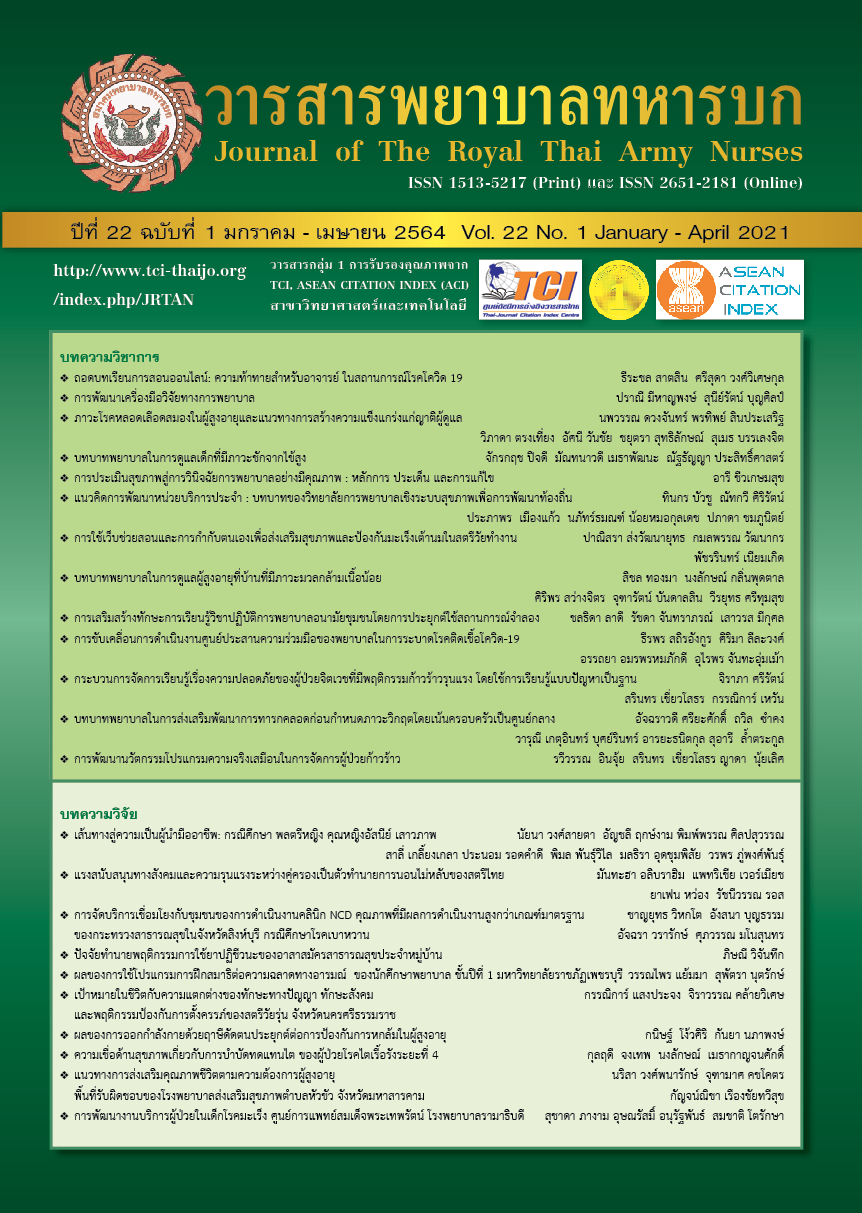Restoring Life Period: The Experience of Recovery as Told by Drug-Treated Male Youth
Keywords:
Recovery, Thai Male youth, Drug treatmentsAbstract
This qualitative research aimed to describe the recovery experiences of Thai male youths with substance abuse who received treatment from the drug treatment center in Chon Buri province. Descriptive phenomenology was used to guide data collection and analysis. In-depth interviews and focus groups were collected by utilizing semi-structured questions with nineteen Thai male youths with substance abuse. Study data were transcribed verbatim for analysis using Colaizzi’s content analysis.
The results revealed that the meaning of youth’s recovery experience was “restoring life period,” which embraced three themes that emerged from their experience toward recovery from substance abuse during received treatment. The first theme was “the path to recovery,” including exposing self to a new world, stepping through the inner world to outside, and acknowledging the significance of livable. The second theme was “signals of recovery,” embracing four things as changing physical conditions, reforming thought, shifting mine, and confidence in socializing. The final theme was support and obstruction recovery. This study provides an understanding of the recovery experience of Thai male youths who have received drug treatments. These results may provide the basis for developing a drug-use care model in line with both the health care providers and the client’s treatment goals to enhance drug treatments’ effectiveness.
Downloads
References
United Nations Office on Drug and Crime (UNODC). World Drug Report 2019. New York: United Nations. 2019.
Narcotic Control Management Center. Substance abuse/addict treatment and rehabilitation report. Nonthaburi: Ministry of Public Health. 2020. (in Thai).
Maffina L, Deane FP, Lyons GC, Crowe TP, Kelly PJ. Relative importance of abstinence in clients’ and clinicians’ perspectives of recovery from drug and alcohol abuse. Substance use & misuse. 2013;48(9):683-90.
Anthony WA. A recovery-oriented service system: Setting some system level standards. Psychiatric rehabilitation journal. 2000;24(2): 159-186.
Jacobson N. A conceptual model of recovery. Madison, Wisconsin: Wisconsin Coalition for Advocacy. 2000.
Davidson L, White W. The concept of recovery as an organizing principle for integrating mental health and addiction services. The journal of behavioral health services & research. 2007;34(2):109-20.
Ballesteros-Urpi A, Slade M, Manley D, Pardo-Hernandez H. Conceptual framework for personal recovery in mental health among children and adolescents: a systematic review and narrative synthesis protocol. BMJ open. 2019;9(8):e029300.
Srithanya Hospital. The guidelines for rehabilitation in psychiatric to recovery: Employment for health care providers. Bangkok, Prosperosplus; 2016. (in Thai).
Panupisuth P, Puangladda S, Tachapisitpong A, Budsuwan P. The effectiveness of recovery oriented programs on hope and quality of life for person with serious mental illness: Systematic review. The Journal of Psychiatric Nursing and Mental Health. 2016;30(1):34-51. (in Thai).
Lakthong S, Chaimongkol N, Hengudomsub P. Enhancing Recovery Process using Solution- Focused Group Therapy in Thai Male Youth Substance Abusers: A Pilot study. Journal of The Royal Thai Army Nurses. 2017;18:315-25. (in Thai).
Injui R, Srirath J, Urailert A. Recovery-oriented nursing for people with mental illness. Journal of The Royal Thai Army Nurse. 2019;20(2): 44-50. (in Thai).
Ritruechai S, Chuwanichwong S, Thaingtham K, Khamwong W, Leeudomwong P. Recovery experience of people living with bipolar disorder: A qualitative study. Journal of health science research. 2019;13(1):95-103. (in Thai).
Oumtanee A. Qualitative research in nursing. Bangkok, Chulalongkorn University Printing House; 2010. (in Thai).
Speziale HS, Streubert HJ, Carpenter DR. Qualitative research in nursing: Advancing the humanistic imperative: Lippincott Williams & Wilkins; 2011.
Whitley R, Drake R E. Recovery: a dimensional approach. Psychiatric services. 2010;61(12): 1248-1250.
Hammer R R, Dingel M J, Ostergren J E, Nowakowski K E, Koening B A. The experience of addition as told by the addicted: Incorporating biological to self-story. Cult Med Psychiatry. 2012;36(4):712-734.
Chang Y, Yen C, Champbell-Heider N. High-risk situations related to relapse of methamphet - amine use among Taiwanese adolescents: An instrumentation study. Journal of Addic - tions Nursing. 2012;23(1):55-64.
Gonzales R, Anglin D, Beattie R, Ong C A, Glik D C. Understanding recovery barriers: Youth perceptions about substance use relapse. American Journal of health and Behavior. 2012;36(5):602-614.
Downloads
Published
How to Cite
Issue
Section
License
บทความหรือข้อคิดเห็นใดใดที่ปรากฏในวารสารพยาบาลทหารบกเป็นวรรณกรรมของผู้เขียน ซึ่งบรรณาธิการหรือสมาคมพยาบาลทหารบก ไม่จำเป็นต้องเห็นด้วย
บทความที่ได้รับการตีพิมพ์เป็นลิขสิทธิ์ของวารสารพยาบาลทหารบก
The ideas and opinions expressed in the Journal of The Royal Thai Army Nurses are those of the authors and not necessarily those
of the editor or Royal Thai Army Nurses Association.






